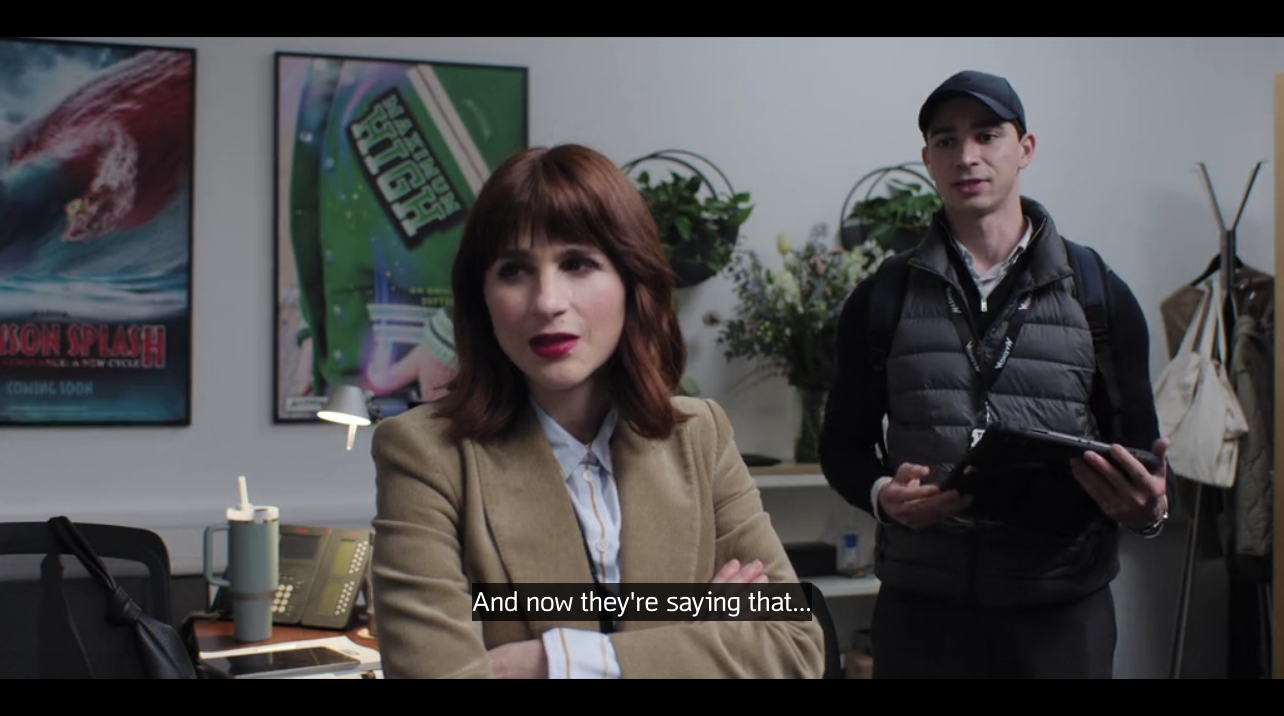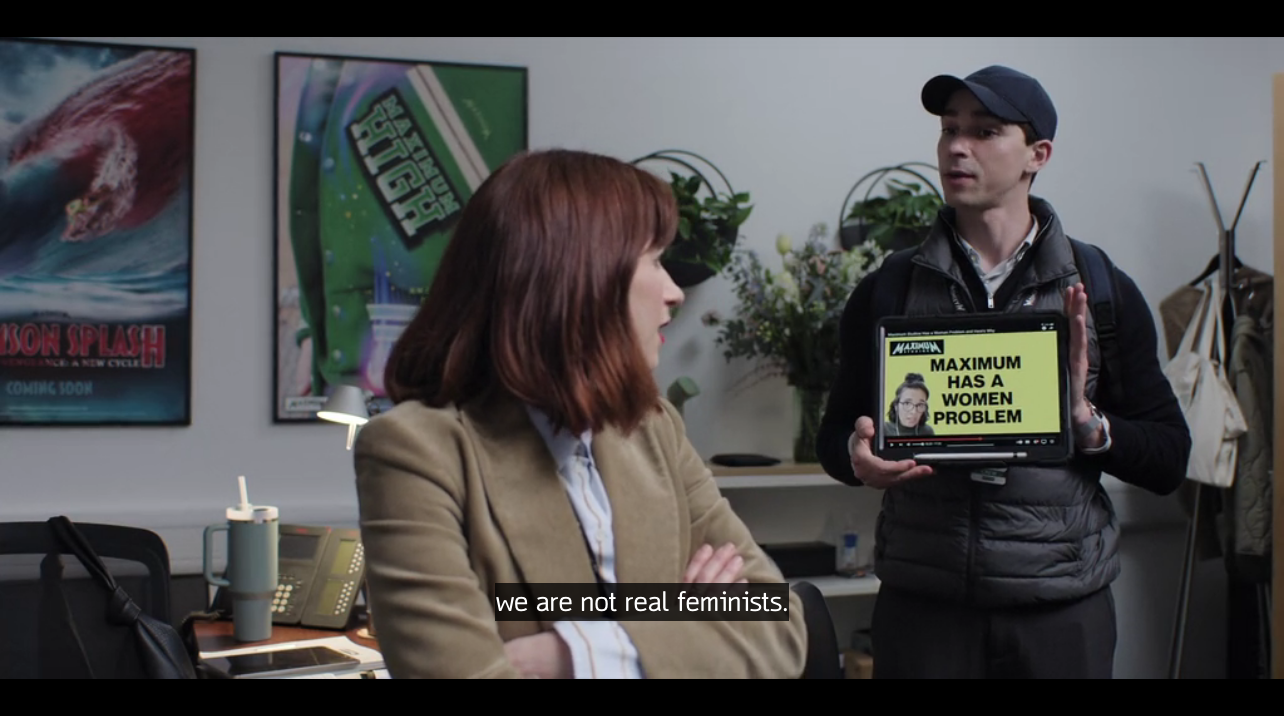CAN FANDOM SAVE THE SUPERHERO FILM? THE FANBOY AUTEUR IN HBO’S THE FRANCHISE
Laurel P. Rogers / University of Texas at Austin
The Franchise’s (HBO, 2024) first — and now only — season ends with a cliffhanger. First assistant director Daniel Kumar (Himesh Patel) has just been fired from the set of Tecto: The Eye of the Storm, the second-tier solo superhero film that the beleaguered crew has been trying to film over the course of the series. Despite saving the film with a bold pitch to the studio head, he has been fired for “sabotaging” the wannabe-auteur director Eric’s (Daniel Brühl) vision. As he prepares to drive home and finally spend time with his son, Dan is approached by the film’s executive producer and offered “exactly what he wants.” Torn between the film and his family, Dan hesitates. The scene cuts to black, and the finale ends.
The Franchise satirizes the superhero industrial complex exemplified by Marvel Studios’ last 15 years of cinematic universe building. While the show spends the bulk of its time mocking the studio’s imperatives, the egos of directors and actors, and other events on set, the show also aims at superhero fans, contemptuously referred to in the first episode as childish “9-year-old TikTok kids.” Even when opinions differ between the feminist “cliterati” and the “militant wing” of misogynist fanboys who tweet death threats to the film’s one female actor, these fans’ opinions still wield enough influence to continuously pull Tecto’s filming off track and send below-the-line workers scrambling.


According to Daniel Herbert, franchising is now Hollywood’s dominant business model.[1] Thanks to convergence culture and increasing corporate conglomeration, the industrial and economic pressures to exploit intellectual property, especially in the form of blockbuster entertainment, continue to rise.[2] Studios rely on familiar intellectual property, and thus on fans to keep watching. However, from this industrial point of view, fans can be unpredictable, and even hostile. Thus, regulating fans and their reactions has become an important part of franchise management.[3]
This industrial logic shapes how fans are positioned within this space, both on screen and off. In The Franchise, Dan Kumar represents fans who are concerned with textual fidelity, and also fills the role of a frustrated “fanboy auteur.” Fan studies scholars have written about the ways that representations of fans in the media can serve disciplinary functions — in other words, how fans act and how they are treated on screen reveal what forms of fan behaviour and affect are accepted and legitimized by the entertainment industries. Dan is shown to have a deep textual knowledge of the comic books that Maximum Studios, the Marvel stand-in, draws from, yet his knowledge is underplayed and disregarded. In the first episode, Dan attempts to calm a panicking extra in a latex mask by assuring him of the importance of his role: “Look, I don’t know if you know the comics. I do. It’s the last thing my dad read to me. And, sir, I would switch places with you in a heartbeat. ’Cause you’re a Fish Man!” In the context of the other fires (sometimes literal) Dan is constantly putting out, this statement falls pretty flat, and when new third AD Dag (Lolly Adefope) asks whether it’s true that his father read these comics to him, Dan responds flippantly. Yet, other scenes indicate that he does actually have a deep knowledge of the comics. In the third episode, when the team needs to juice up a minor character’s role to help fix the studio’s “woman problem,” Dan’s objections that giving the Lilac Ghost another hero’s weapon, the “Stick of Maximum Potency,” doesn’t work diegetically are continuously disregarded.
The figure of the “fanboy auteur” is another way that entertainment industries can attempt to manage fans.[4] A fanboy auteur is someone in a role of creative control, such as director, showrunner, or producer, who professes his own fandom of the property. In demonstrating his fandom, the fanboy auteur earns the fans’ trust, which enables him to wrangle fans into industrially-compliant consumption. For most of the series, Dan seems like a frustrated fanboy auteur. He knows and loves the comics, yet is powerless to ensure narrative and character fidelity. In fact, his winning pitch in the finale rests on a return to the source material. He pitches “a tonal pivot […] Instead of being dark and serious, we’re, we’re light and fun. Just like the original comics.” (Speaking of fanboy auteurs and toxic fans, Dan’s desired changes are at times called “The Kumar Cut,” a tongue-in-cheek reference to the situation around the “Snyder Cut” of 2017’s Justice League.[5]) Yet the pitch seems to fail — the studio head’s response is to ask for orange juice. Here, as in the scenes decrying woke feminists and kids on TikTok, fans are seen as nuisances, whose desires for representation or for source material accuracy simply disrupt the filming process, cost exorbitant amounts of money, cause stress to cast and crew, and are on the whole unnecessary complications.
In the end, however, it is Dan’s fandom that saves the day. His ability to translate his knowledge of the comics into a new direction for the film is finally seen as a strength, winning over the studio head. Dan finds himself in the dream position of both a fanboy and of a beleaguered below-the-line worker with creative aspirations: offered creative control over a property he knows how to do right by. He is — or has the potential to be — a fanboy auteur.
After eight episodes of unrelenting cynicism, this ending’s hopeful twist is a bit jarring. Regardless of your actual feelings on the value of superhero films and comic book franchises — for my part, despite my enjoyment of the show, I don’t know that I fully agree with its ultra-cynical take — The Franchise has spent the entire rest of the series trying to convince viewers that there is nothing worth saving in these films. Yet the ending seems to suggest that fandom still matters and there is something worth saving in these ultra-commercial productions.
This tonal shift invites questions about how to read the ending, which sits in unresolved tension between hopeful fandom and industrial cynicism. Was the ending meant to reflect a hope that true fandom can save the superhero industrial complex? Was it setting up a critique of the fanboy auteur in the second season? Would a second season have doubled down on the ways that these productions exploit below-the-line workers? Was there industrial pressure — conscious or unconscious — to rehabilitate the superhero franchise, or the fanboy auteur? After all, HBO is owned by Warner Bros. Discovery, which also owns DC Comics and produces DC superhero films. As the series was not renewed, we’ll never know how this ending was meant to be taken. One thing is for sure: for the crew, whose budget may have been tripled but whose schedule was halved, even a fanboy at the reins simply means more work.
Image Credits:
- Trailer for The Franchise.
- Maximum Studios, a stand-in for Marvel, “has a woman problem.” 1.03, “Scene 54: The Lilac Ghost” (author’s screengrabs).
- The gang brainstorm ways to amp up a minor female character’s role, while Dan’s comics knowledge is disregarded. 1.03, “Scene 54: The Lilac Ghost.”
- Daniel Herbert, Film Remakes and Franchises (Rutgers University Press, 2017); see also Derek Johnson, Media Franchising: Creative License and Collaboration in the Culture Industries (New York University Press, 2013). [↩]
- Henry Jenkins, Convergence Culture: Where Old and New Media Collide (New York University Press, 2006). [↩]
- Derek Johnson, “Fantagonism, Franchising, and Industry Management of Fan Privilege,” in Routledge Companion to Media Fandom, ed. Melissa A. Click and Suzanne Scott (Routledge, 2018); Mel Stanfill, Exploiting Fandom: How Media Industries Seek to Manipulate Fans (University of Iowa Press, 2019). [↩]
- Suzanne Scott, “Who’s Steering the Mothership? The Role of the Fanboy Auteur in Transmedia Storytelling,” in The Participatory Cultures Handbook, ed. Aaron Alan Delwiche and Jennifer Jacobs Henderson (Routledge, 2013); Suzanne Scott, Fake Geek Girls: Fandom, Gender, and the Convergence Culture Industry (New York University Press, 2019); Anastasia Salter and Mel Stanfill, A Portrait of the Auteur as Fanboy: The Construction of Authorship in Transmedia Franchises (University Press of Mississippi, 2020). I have also previously written about fanboy auteurs for Flow. [↩]
- Anastasia Salter and Mel Stanfill, “Zack Snyder and the Professional Toxic Fanboy,” in A Portrait of the Auteur as Fanboy: The Construction of Authorship in Transmedia Franchises (University Press of Mississippi, 2020). [↩]
Interesting parallels between cinema and sports fans and maybe the concept of BIRG and CORF
Uwielbiam takie treści! 💫🔥🌈
I found this argument compelling, especially when the article explores how The Franchise satirizes the superhero industrial complex. It makes me wonder if fans in creative roles can push back against franchise fatigue, or if they’re still bound by the same commercial pressures.
Do you think audiences expect fanboy auteurs to deliver differently because they ‘know’ the lore more intimately?